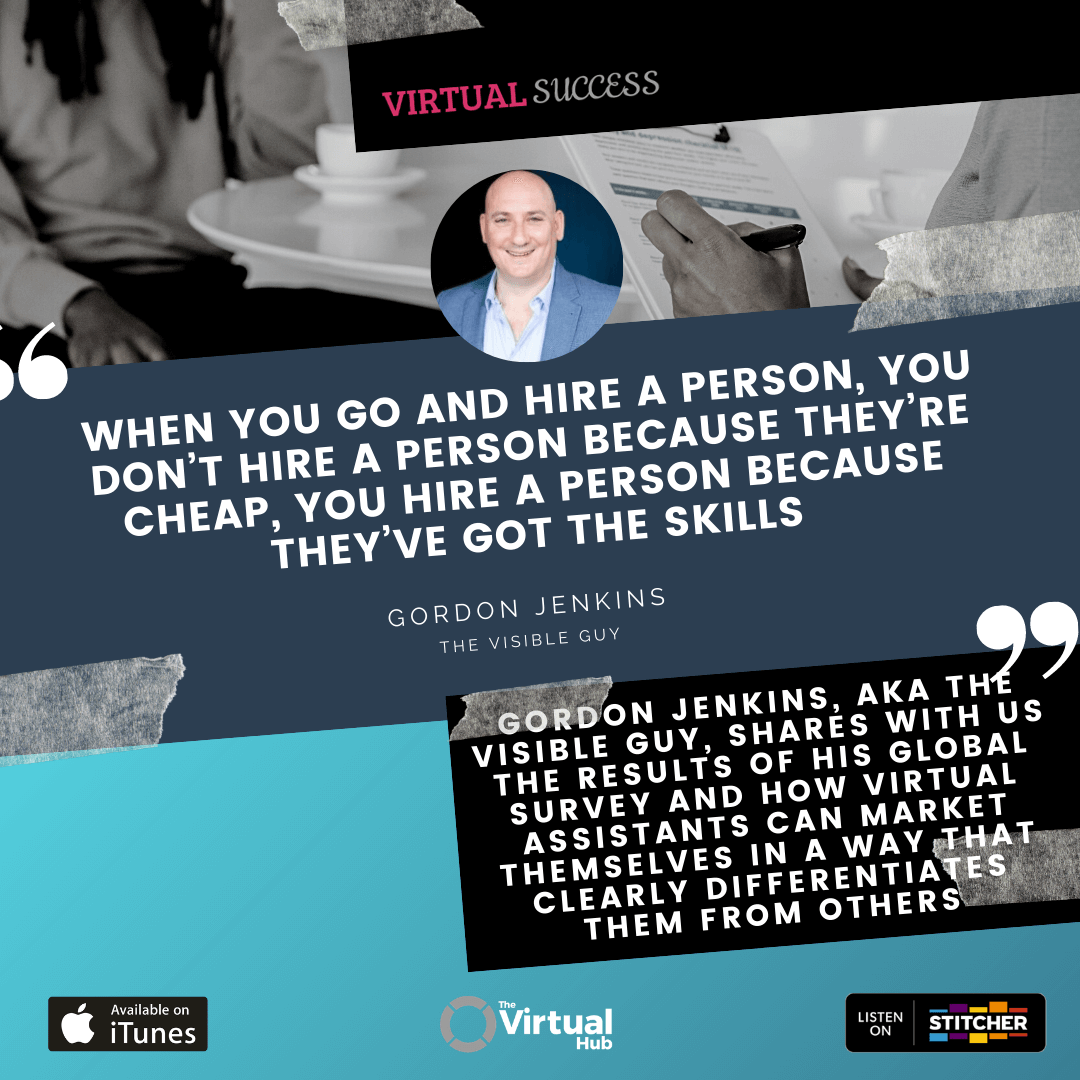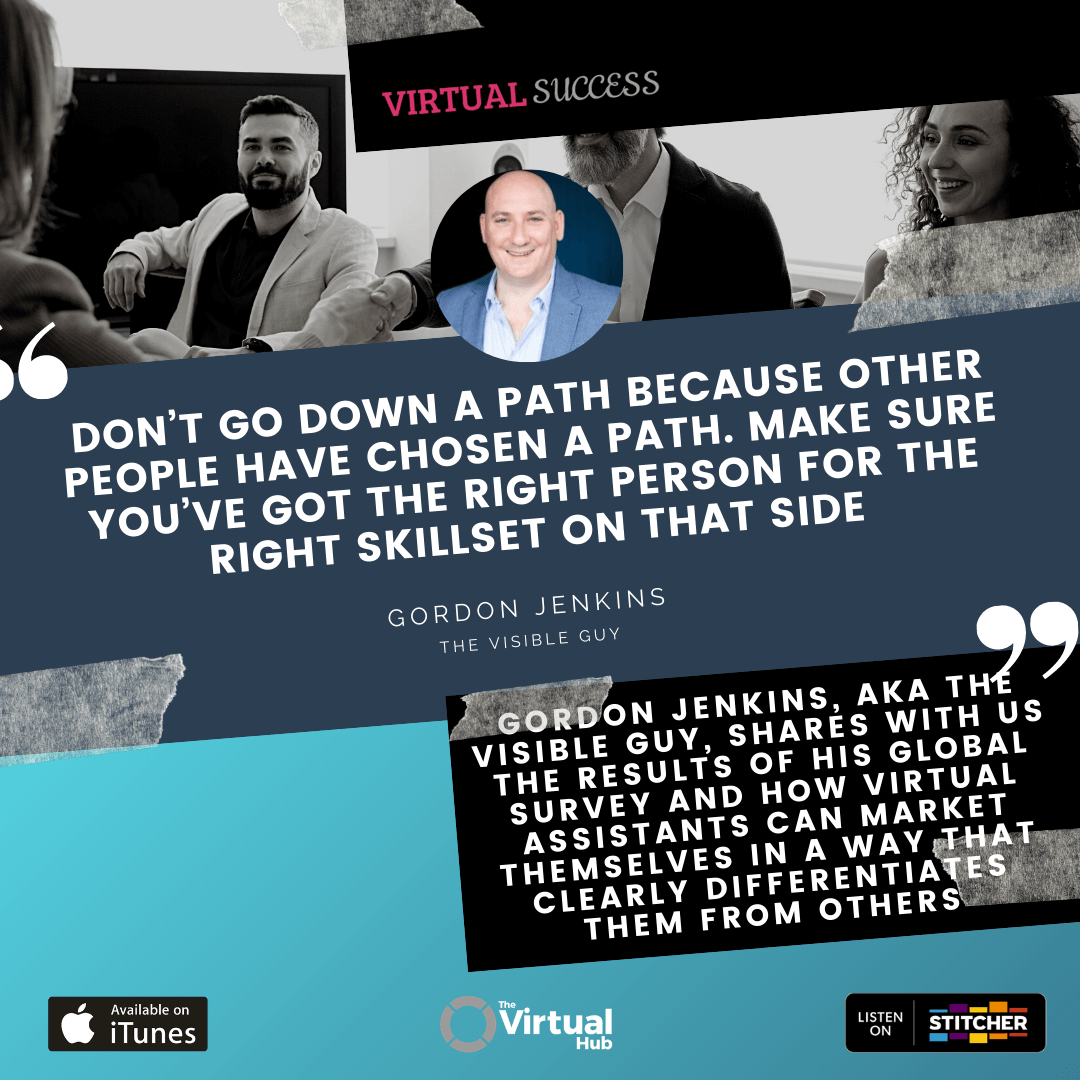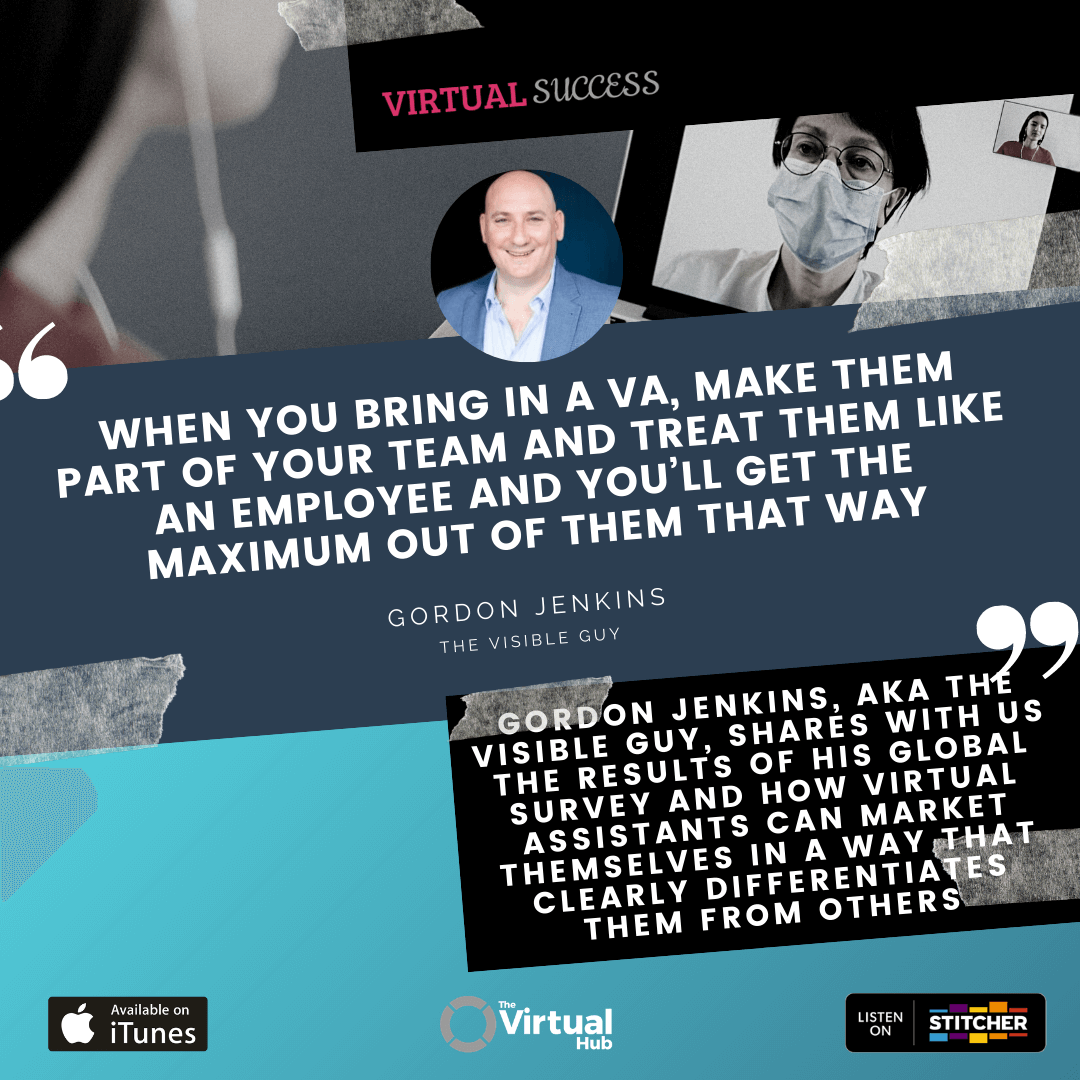Gordon Jenkins, aka The Visible Guy, Shares With Us The Results of His Global Survey and How Virtual Assistants Can Market Themselves in a Way That Clearly Differentiates Them From Others
Want the transcript? Download it here.
In this episode, special guest, Gordon Jenkins, takes listeners through the results of a global survey he conducted aimed at people who have used, or are using, Virtual Assistants to get their feedback on exactly what they look for when engaging the services of a VA…and the results may surprise you!
Gordon touches on some of the more stand out results from the survey and explains how VAs and their clients may need to shift their thinking in order to gain more success from the client/VA relationship.
Some of the areas covered include:
- The importance of verbal communication – emails alone are not enough
- Just because an employee is virtual, doesn’t mean they aren’t part of your team
- As a VA, client perception is your reality – so really understand what your client is looking for
- As a client, be really clear on what your expectations are – so you can set your VA up for success
Let us know what your key takeout has been from this episode and join the continuing conversation over in the Virtual Success Facebook Group.
Resources mentioned in this show:
20 Different Ways to Differentiate Yourself
In this episode:
01:45 – The Visible Guy…Gordon Jenkins
02:59 – Surveying clients of VAs to find out what they really want
06:40 – Stand out results from the survey
08:06 – The importance of verbal communication
13:51 – Just because your VA is virtual, doesn’t mean they aren’t part of your team
16:26 – Email shouldn’t be your only form of communication with your VA
18:15 – Top 3 tips to gain success as a client or VA
20:50 – As the client, be clear on what your expectations are of your VA
25:31 – Wrapping things up
Barbara: Hey everyone, and welcome back again to the Virtual Success Show where I’m joined by my co-host, Matt Malouf. Matt, how’s it going?
Matt: Excellent, Barb. How are you?
Barbara: I’m very good, thank you. How’s your week been?
Matt: The week’s been great. It’s been busy but it’s been really, really good, and having great conversations with many entrepreneurs out there at the moment. It’s a really exciting time for business owners and entrepreneurs at the moment.
Barbara: Yeah, and how about your book? Is it starting to fly off the shelves, The Stop Doing List?
Matt: It is, it is, and we’ve recorded the audible version so that should be coming out in the next little bit, so very, very exciting.
Barbara: Brilliant. Brilliant. Well, listen, on today’s show we’ve got a very interesting guest to talk about client feedback and a survey that he did with clients that are using, or have used, Virtual Assistants in the past. So my guest today, or our guest today, is Gordon Jenkins, who’s actually called The Visible Guy.
Gordon, welcome to the show.
Gordon: Welcome. Good morning, Barbara. Good morning, Matt. How are you?
Matt: Good thank you.
Barbara: Good. So, Gordon, just to kick off, can you just give us…you know, who The Visible Guy? Talk to us about who is the The Visible Guy and what does The Visible Guy do?
The Visible Guy…Gordon Jenkins
Gordon: Sure, so a quick snapshot … The Visible Guy, in simple terms: we look at people and organisations and we look at what they are and then simply we go and tell the world what they actually do and the world is simply their marketplace, so it could be just the people in Melbourne or it could be we’re going to take people globally and tell the world about exactly what they’re doing. We do it in a way that is not talking about what’s unique about the person or the organisation, but we look at what’s the clear differentiations, and it’s as simple as that.
Barbara: That’s very interesting. When you recently, just for the listeners, Gordon was asked … he was a speaker at the Virtual Assistant … is it at the Virtual Assistant’s Association Conference here in Australia?
Gordon: Yeah, here in Australia, yeah.
Barbara: Yeah, and you took a very unique approach which demonstrates, I guess, exactly what you do. You were speaking to a room full of virtual assistants, but you developed your talk and your session from feedback from the other side, which would be their clients or the client of the Virtual Assistant. So talk us through…you started out with an amazing survey actually, which I also participated in. Talk us through the survey.
Surveying clients of VAs to find out what they really want
Gordon: Sure, I’d love to do that. What I do, what The Visible Guy actually goes about and does is we look at client perception because at the end of the day, client perception is your reality whether you like it or not. The client’s perception of who you are and what you are really determines the ambassadors, whether you’ve got positive or negative ambassadors, and also the influencers.
So, what I did is I put out a global survey to my networks, and to people’s networks, and asked for people that have either used or are using Virtual Assistants and to get their feedback, exactly what they looked for. The response was amazing. I think one of the key factors that came out is … I know it sounds a bit strange but what clients want from Virtual Assistants, no matter where they are in the world or whatever sector they’re in, is virtually the same, and I’ll give you a couple of examples on that.
We asked the clients about how do they communicate, and not surprisingly 77% came back and said they want to use email to communicate. We started asking questions about how are they charged. Whilst a lot of the clients came back and said they’re charged by the hour, what they much prefer to do is actually be charged on a retainer, and when I actually worked out the numbers between being charged on a retainer or being charged by an hour, the Virtual Assistant would actually make more money being charged at the client on a retainer. So when you think about what the client wants then that’s what you should give them.
Then we asked the clients about how likely would they be to recommend their Virtual Assistant to their network? Not surprisingly, the score came out around about 8 out of 10, which you would expect. But the beauty of the survey was that we actually got some clients who said that their assistant is only 2 out of 10, or 3 out of 10, which is really interesting because that gave me the robustness of the survey. But then I went-
Barbara: So, sorry, I just want to cut in for a second. So they rated their VA only 2 or 3 out of 10, but most of them said they would recommend that VA to others? Have I got that right?
Gordon: The question was: how likely are you to recommend your VA? They put 2 out of 10, or 3 out of 10 …
Barbara: Oh, I see.
Gordon: … on a rating, and then when I went back and then we asked another question … it’s really important the way that these questions are asked so we don’t get any emotional responses … we asked them a question that was: what are the three top questions you want to know from your VA or your prospective VA? And the number one question that came back was: how do I integrate my Virtual Assistant into my business? And I thought that was a really powerful and extreme question, and when I presented at the Virtual Assistants Conference, I asked the audience, and I said “What is the reason for people to use your services?” And they said because of our pricing, because we’re professional, because we’re dedicated … the usual type of wording. I turned around to them and I said, “Look, the number one question that’s come back globally is: how do I integrate a Virtual Assistant into my business?” And I asked them how do you do it? And the room went quiet. I said, “Now, just think about the power of that if your first page on your website was the question: how do I integrate into your business? Can you answer that? Just think about how powerful and differential that question is.”
Stand out results from the survey
Barbara: Now, there’s three things that stand out for me from this survey. The very interesting one is when you say, “how likely are they to refer their VA or recommend their VA?”, a 2 out of 10 or a 3 out of 10 is very low. The essence of this show, the Virtual Success Show, is because there are lots of VAs globally and there are lots of clients using VAs, but there’s a small number of people actually getting success with a VA and in turn probably VAs getting success therefore with clients. A few things that I would pick in here, and I know Matt’s going to step in and probably back me up or have some more to add here, but we go back to the first question: how do you prefer to communicate with a VA? Email. I think that’s a major, major problem, so that can cause like a great VA, with a client who really wants to get success, this can all fall down because there’s no… emails challenging in terms of VA client relationship.
Number two, as you say, this integration thing. So the client doesn’t actually know how to integrate someone themselves and they’re hoping that a VA can teach them how to integrate or can come in and fix that problem, but neither side actually really knows how to do it. So, therefore, I think that’s probably why the success rates are actually low.
Matt, I’m interested to hear your thoughts here.
The importance of verbal communication
Matt: Hundred percent. I mean, we talked about … I think it was one of the earlier shows that we did, Barb … around communication, and the beauty with technology these days is you can replicate an office environment in a virtual environment, and so I just think would you prefer your staff, if they were in your office, to be emailing one another, or would you prefer them to have a short conversation to understand what’s expected and how to get something done? Would you call somebody into your office and go through something with them, or would you send them an email?
In fact I was presenting last week and a gentleman wants to get started with a Virtual Assistant, but he’s like, “Oh, you know, ideally, I’d only like to speak to them once every one to two weeks and I’ll communicate via email.” And I’m like, “You will fail. It will fail.”
Barbara: Yeah, a hundred percent, you’ll fail.
Matt: Yeah. Because they’re virtual, virtual meaning they’re environment is not in your environment, they’re somewhere else, doesn’t mean the communication for effectiveness changes. So I find that quite amazing, that statistic.
Gordon: That’s absolutely fine. We’ve all come from global organisations and what I try to explain to the Virtual Assistant, you’re either virtual … It’s no different to having a team based in Hong Kong, Manila, London, New York, Los Angeles, that’s virtual, and you would get on the phone and you’d have a weekly conference call. These questions where people are saying I’ll only talk to them every couple of weeks, well, you wouldn’t do that with an employee. An employee, you would make them part of the team.
The technology today enables us … it’s not the driver … it enables the communication, it enables the integration. So you think when these people are giving themselves 2 out of 10 for the Virtual Assistant, is the problem the Virtual Assistant? The person who has the problem, the manager, the person themselves, because they’ve not actually thought about what they want this person for. They’re not actually thinking about integrating into the team.
Matt: It’s so interesting, Gordon, because I interpret that as they’re giving themselves a 2 out of 10 with regards to their effectiveness to integrate and manage a Virtual Assistant.
Gordon: If I want my car fixed, I go to the car mechanic. If I want my teeth fixied, I go to the dentist. It seems to be that when we employ people, and this is what it is, we are actually employing people, we seem to be able to think we can do it all ourselves. Well, you know, I’m a great public speaker and I’m a great coach, I’m not that good at … When I want to employ people, I bring in the experts to help me and if I want to bring in a Virtual Assistant, I look at their skill base but I go to the experts to help me bring them on board and they are part of my team, no matter what organisation I’ve worked on, whether I’ve had contractors, part-time people, volunteer people … The moment they step into my business, they’re part of my team.
Barbara: Absolutely. As you say, even if they’re a volunteer or a student coming in for some work experience, they’re still part of your team for that duration.
Gordon: And there seems to be that missing point. I don’t think we can put all the blame on the employer, but we don’t put all the blame on the employee either. But what we can tell when we get the great results, and definitely when we look at the results of those being on the retainer, those Virtual Assistants being on the retainer, is when the businesses have actually integrated them into the business.
Barbara: Effectively, yeah. Now, I’m interested to know, was there any feedback from the Virtual Assistants at the event, how they would like to communicate? So they’re probably just doing email because the client wants that, but did you get any insights from that? You may not have, I’m not sure.
Gordon: I think it tends to be the status quo in terms of email … There’s very few of them that said we have a weekly conference, and I think this is the size of the organisations as well. If it tends to be a one or two person business, there tends to be a lot more organisation than in a larger business. I was really interested to see that everything is technology driven and my biggest concern from that is there isn’t that interaction and we all know how email can have no emotion attached to it. For me, it takes me longer to write an email than it does to pick up the phone and have a conversation, so I think from an efficiency perspective, I’d rather have the conversation.
Barbara: Yeah. Just for the listeners, Gordon and I worked in the financial services sector in investment banks and this sort of area where every day we’re interacting with global teams, so although Gordon and I were both in Australia, we were interacting with people in Hong Kong, New York, London, all the time, every day, and as you would know, Gordon … You know the morning meeting? It’s like a massive huddle where basically there’s TV screens in the room, there might be 30 or 40 people in a room, maybe 50 sometimes, there would be several TV screens on the wall with all the different offices dialing in. It’s like a big stand-up huddle. All the analysts get up and give their key points for the day, the traders give their points and everybody’s part of this whole communication thing. The meeting in the morning is like the most important … if you’re late for that meeting, it’s really bad, isn’t it? Because the communication is so vital to get the day started properly and there’s no way that we could just meet once a week, and that’s with hundreds of people would go to these meetings and yet it was quite effective.
Gordon: It was just the way we do business. In fact, we had a virtual team without actually even putting a label on it. For us it was just a team.
Barbara: Yeah, we were all part of the one team.
Just because your VA is virtual, doesn’t mean they aren’t part of your team
Gordon: We don’t put labels on it. I know we talk about big banks and big financial institutions where they have all these buzz words, but really it was just I’m just speaking to the New York team today or the Hong Kong team or the Perth team or the Sydney team. It’s just the way you did business and we use technology to be in any market and I think we put this thing about being virtual that, we’ve got this impression that they’re not part of the team. Well, they actually are part of the team. The reason why they’re part of the team is because they’re doing a job that they’re skilled at where you don’t have that skill in the team already.
Barbara: I think as well, if I think back, I don’t know about you, but I know I worked on a trading floor. I mean, gosh, there’s no way you could communicate by email. That’s like you may as well send a letter by mail. I mean, it’s too slow, so we did have chat forums, we had video conferencing, we were doing it all the time, so I think in a fast environment like that, if I think about it, it’s actually kind of similar as a small business owner running around the place, mad busy with a VA in the Philippines. I mean really you’re so busy that, email… things get lost in translation. It takes too long to get back, to read … You’re better off having project management tools and then having good communication flow, either using … Matt, I know you use … what’s that Dropbox … ?
Matt: Dropbox or … yeah-
Barbara: Dropbox.
Matt: – we use Slack.
Barbara: Slack, Dropbox, all these tools that you can get quick communication to your team and make sure things are not lost in translation.
Gordon: I think so. You know, apparently one other thing when I did the survey, there’s just over a hundred different categories that are classified as Virtual Assistants, that’s everything from custom web page design to marketing to cold calling, the whole scheme, so the whole world of Virtual Assistant is quite wide. When you ask the Virtual Assistants how they differentiate themselves, they’re talking about price. It all comes down to we’re cheap, we’re cheap, we’re cheap. And I keep on saying, it doesn’t matter what business you are, a Virtual Assistant is there to compliment your business, it’s there to integrate in your business. When you go and hire a person, you don’t hire a person because they’re cheap, you hire a person because they’ve got the skills, not only to do the job, but hopefully they can add some innovation, some creativity, and so they have the same values associated with your business. I think that’s really, really important that we don’t lose sight again. The Virtual Assistant, the virtual is just the office. The assistant is part of your team and you want to employ a Virtual Assistant, it’s exactly the same as if you employed a person who’s actually sat in your office …

Matt: Absolutely.
Barbara: Yeah.
Gordon: … with the right skill set, and you need the right people behind you in order to employ those people.
Email shouldn’t be your only form of communication with your VA
Matt: And just to add to the conversation, I just want to make a point that I don’t think any of us here are saying that email shouldn’t be used, but I think we’re all in agreeance that email, as the primary form of communication with a virtual team member, is probably not effective or appropriate, and it’s certainly not the recipe for success with your virtual team. It has its place and I know that I communicate via email on certain things with my team, particularly when it involves potentially copying them in on correspondence with clients or other suppliers and the like, however as a primary form of communication, it’s very impersonal.
Emails are read in … they’ve not always got the right tonality and they’re read in somebody else’s voice, not in the voice of the person who’s writing the email. We think it’s more efficient, but it’s actually very inefficient over the long-run.
Gordon: The other thing for that matter, because the person is part of the team, when you’re talking about where your business is going and where they’re developing, those Virtual Assistants in Manila will have their own network and they’ll go, “You know what? We might have someone who can help here. Or actually, I know someone who’s got a client in New York or a client in Sydney that can help you with here.” So, it’s a way of networking.
I talk about there’s different pathways, there’s over 30 pathways to networking and ways to differentiate yourself, and I think it’s really about allowing that person … and it comes back that person must be part of your team. You must share everything with them because we don’t know how wide their network is either, and that’s where I think we see the real difference.
Matt: Absolutely.
Top 3 tips to gain success as a client or VA
Barbara: Yeah. Gordon, what would you say from doing the survey, doing the conference, could you sort of summarise for us, like what would be your top three tips or action steps in order to get success, be it as a client or a VAs? Because you were talking to the VAs about how to market themselves, basically, how to become more visible to differentiate themselves, but also for clients looking to hire a VA, what should they be looking for? What are the top three action steps you could give to our listeners?
Gordon: I think one of the things I … I talked a lot about it at the beginning is one of them is about client perception is your reality, so really understand what your client is looking for and I’ve used the question of ‘how do I integrate into your business?’, not just with VAs, but I’ve taken that into other businesses, physical businesses, and that’s a question I ask all the time now and it’s quite a powerful question. So, the top tip is to understand your differentiation and how do you integrate, I think is one thing.
The second way is looking at what works for you and when I look at some of the low scores that’s come through, and it happens to someone who’s been referred but you’ve got an individual need for a VA, so make sure that how you’re going to look for that VA or what you want that VA to do is very specific to you. So what I say: don’t go down a path because other people have chosen a path. Make sure you’ve got the right person for the right skillset on that side.

And for VAs, the other thing I would say about VAs is don’t treat them like an expert in a vacuum. And what I mean, these VAs are extremely skilled, but they’re extremely knowledgeable just like another employee, and don’t just keep them in a huddle.
When I look at the business of a VA, the VA’s exactly the same as any other business I look at, so I think client perception is key. I think when I look at the VAs in terms of going out and seeking business and clients seeking business, they’re trying to do everything themselves and I’m saying no, you can’t do it yourself. You’ve really got to get the assistants and go and get assistants, and the other one I put down is I find excuses because they don’t do things because of this, because of that … and I turn round to them and say, “Don’t stop believing because others make excuses for doing something.”
I think those are the three business tips I give to people that are asking, if that’s clear enough for you, to go out … There’s a massive world out there, there’s a massive world out there for VAs, people are crying out for VAs, you just need to know how you can integrate into the business.
As the client, be clear on what your expectations are of your VA
Matt: Absolutely, and I think in those three points when we talk about client perception there, I think if you’re employing a VA or inviting a VA to become part of your team, as the client, you need to be clear on what your expectations are as well. As much as it’s about the VA working out how they can integrate into the business, I think it’s really important for you as the employer to get clear on what does success look like for this person? And actually communicating that with them so you set them up to win, otherwise there’s this unspoken expectation. You can’t hit something that you can’t see, so I think that’s invaluable information there and knowledge.
Gordon, is there anything else, just in wrapping up, anything else that you’d love for the listeners…Any other particular insights from the survey that you’d love to share just in closing?
Gordon: Sure, so from a VA perspective, my common segment, my presentation of the speaking about it I did wasn’t about networking with a purpose and how to be visible. What I talked about was there’s 30 different ways to network and there’s 20 different ways to differentiate yourself and when I went through how do people find the VA, finding it through a referral was only 30%, so people did search on social media and they did things through the web and they were searching elsewhere. One of the questions was, how do we differentiate yourself? I said, “Well, I became a speaker and a coach because I made myself visible, because I’m not a good writer, but one of the things was I got published in CEO Magazine as a person of expertise, so there’s different ways to publish yourself.

What I’m finding through the surveys I do is people have been sought, not because they’re turning up to networking events, but because they’re providing information, providing thought leadership into the marketplace, so that’s one thing I told the VAs to get out there and start doing. Don’t start selling your services, start selling your thought leadership and your integration, and there’s different ways to differentiate yourself. There are a 101 different ways to be a VA. If you are a web marketing VA specialist, don’t call yourself a Virtual Assistant, just call yourself a web marketing person.
Barbara: Yeah, that’s very true, because everyone calls themselves a VA. As you say, it’s a very broad term. What is a VA? Yeah.
Gordon: The VA is just the office we sit in.
Matt: Exactly.
Barbara: That’s true, yeah.
Gordon: It’s not that you have an employee of the business to do that, and any perspective employers listening now on this podcast, what I’d say to you is your advice is when you bring in a VA, make them part of your team and treat them like an employee and you’ll get the maximum out of them that way.
Barbara: Yeah. I know, that’s so true. It’s like any person, really. Gordon, we’ll put links to those downloads … what is it? The 30 ways to network and …
Gordon: Yeah, 20 different ways to differentiate.
Barbara: Yeah, because that can apply to any business. That’s not just for VAs. Any business at all can use those.
Gordon: You know what? I’ll tell you, you can go on the web and look at networking and everything else, and it’s not about identifying the pathway, it’s identifying how you actually go on that pathway and what you actually do on that pathway. It’s a bit like when we use the word for the investment banks, we can give people 20 tips on what stocks to buy, but actually when you go and buy and how you actually go and buy the stock is completely different.
Barbara: Absolutely, yeah.
Gordon: To me, it’s like we’ve got the ingredients, but the real skillset is how you actually mix the ingredients together to get the right product on the outside.
Barbara: I think I might use that terminology for how Virtual Angel Hub was born, because the ingredients are all there. Our business has been built out of showing people actually how to integrate and doing them properly, so that’s …
Gordon: And your real IP and your real differentiation is that formula, and like any good food producer, you’re not going to give away your formula.
Barbara: Well, yeah. Anyone can have one, because I always say I challenge anyone to try it by themselves because it is an extraordinarily difficult business to get right, when you’re dealing with people. People businesses are very rewarding but it’s a tough gig, yeah. Tough to get the formula right. It’s like a Master Chef recipe
Gordon: It is, that’s exactly what it is.
Barbara: The Master Chef of VA. Maybe we’ll call ourselves that.
Wrapping things up
Matt: Well, Gordon, thanks for your time today and your insights.
Gordon: It’s a pleasure.
Matt: It’s been absolutely invaluable. And for the listeners, we’ve got the links below and on the website – virtualsuccessshow.com – that you can download those downloads that Gordon was talking about. Please share the show with others and we’d love you to write a review, also. But also write into us and let us know if there’s any other specific topics you’d like us to talk about on this show because the show is built about helping you achieve and succeed with Virtual Assistants.
So, thanks Gordon. Thanks Barbara.
Gordon: Pleasure.
Barbara: Thanks everyone.
Matt: We’ll see you all on the next show. Have a beautiful week and we’ll speak to you all soon.
Barbara: Thanks.
Gordon: Thank you.
The Hosts
 Matt Malouf
Matt Malouf
Matt Malouf is a passionate business coach, speaker, author and entrepreneur on a mission to help entrepreneurs around the world break the shackles of mediocrity and reach new levels of personal and business success.
 Barbara Turley
Barbara Turley
Barbara Turley is the Founder & CEO of The Virtual Hub, a company that specializes in recruiting, training and managing superstar ‘Virtual Assistants’ in the social media, digital marketing and systems automation space.
